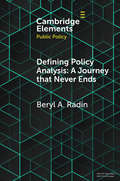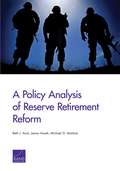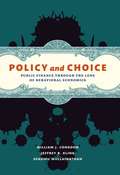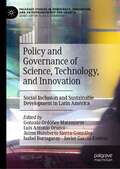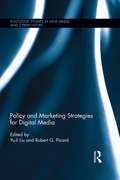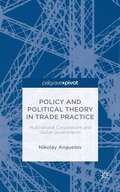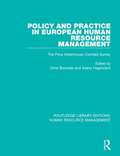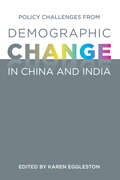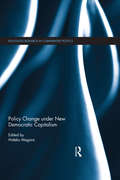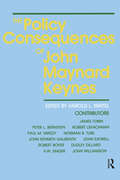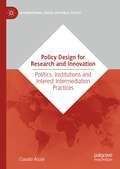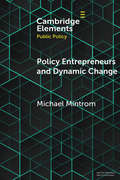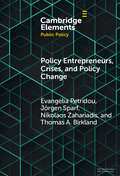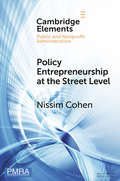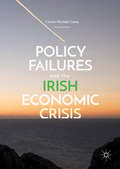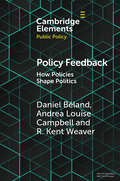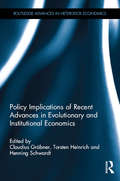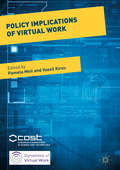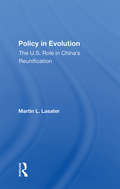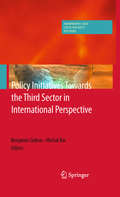- Table View
- List View
Policy Analysis: Theory and Practice (Elements in Public Policy)
by Beryl A. RadinFor much of its life, the field of policy analysis has lived with a wide range of definitions of its goals, work and significance in the society. This Element seeks to sort out these differences by describing the issues, players and developments that have played a role over the life of this field. As a result of the relationships that have developed an environment has emerged where both academics and practitioners who self identify as 'policy analysts' are not always recognized as such by others who use that same label. This Element explores the reasons why this conflictual situation has developed and whether the current status is a major departure from the past. While these developments may not be new or found only in policy analysis, they do have an impact on the status of the academics as well as the practitioners in the field.
A Policy Analysis of Reserve Retirement Reform
by Beth J. Asch James Hosek Michael G. MattockAs the defense burden borne by reserve forces has increased, more attention has been paid to differences between retirement systems for the reserve and active components. This report analyzes the systems, discusses the importance of structuring compensation to enable management flexibility, considers obstacles and how they might be overcome, and provides a quantitative assessment of the reserve retention and cost effects of possible proposals.
Policy and Choice
by William J. Congdon Sendhil Mullainathan Jeffrey R. KlingTraditional public finance provides a powerful framework for policy analysis, but it relies on a model of human behavior that the new science of behavioral economics increasingly calls into question. In Policy and Choice economists William Congdon, Jeffrey Kling, and Sendhil Mullainathan argue that public finance not only can incorporate many lessons of behavioral economics but also can serve as a solid foundation from which to apply insights from psychology to questions of economic policy.The authors revisit the core questions of public finance, armed with a richer perspective on human behavior. They do not merely apply findings from psychology to specific economic problems; instead, they explore how psychological factors actually reshape core concepts in public finance such as moral hazard, deadweight loss, and incentives.Part one sets the stage for integrating behavioral economics into public finance by interpreting the evidence from psychology and developing a framework for applying it to questions in public finance. In part two, the authors apply that framework to specific topics in public finance, including social insurance, externalities and public goods, income support and redistribution, and taxation.In doing so, the authors build a unified analytical approach that encompasses both traditional policy levers, such as taxes and subsidies, and more psychologically informed instruments. The net result of this innovative approach is a fully behavioral public finance, an integration of psychology and the economics of the public sector that is explicit, systematic, rigorous, and realistic.
Policy and Choice
by Jeffrey R. Kling William J. Congdon Sendhil MullainathanTraditional public finance provides a powerful framework for policy analysis, but it relies on a model of human behavior that the new science of behavioral economics increasingly calls into question. In Policy and Choice economists William Congdon, Jeffrey Kling, and Sendhil Mullainathan argue that public finance not only can incorporate many lessons of behavioral economics but also can serve as a solid foundation from which to apply insights from psychology to questions of economic policy.The authors revisit the core questions of public finance, armed with a richer perspective on human behavior. They do not merely apply findings from psychology to specific economic problems; instead, they explore how psychological factors actually reshape core concepts in public finance such as moral hazard, deadweight loss, and incentives.Part one sets the stage for integrating behavioral economics into public finance by interpreting the evidence from psychology and developing a framework for applying it to questions in public finance. In part two, the authors apply that framework to specific topics in public finance, including social insurance, externalities and public goods, income support and redistribution, and taxation.In doing so, the authors build a unified analytical approach that encompasses both traditional policy levers, such as taxes and subsidies, and more psychologically informed instruments. The net result of this innovative approach is a fully behavioral public finance, an integration of psychology and the economics of the public sector that is explicit, systematic, rigorous, and realistic.
Policy and Governance of Science, Technology, and Innovation: Social Inclusion and Sustainable Development in Latin América (Palgrave Studies in Democracy, Innovation, and Entrepreneurship for Growth)
by Gonzalo Ordóñez-Matamoros Luis Antonio Orozco Jaime Humberto Sierra-González Isabel Bortagaray Javier García-EstévezThis volume explores the governance and management of science, technology, and innovation (STI) in relation to innovation policy and governance systems, highlighting its goal, challenges, and opportunities. Divided into two sections, it addresses the role of governments in promoting innovation in Latin-American contexts as well as barriers and opportunities for STI governance in the region. The chapters tackle the role of institutions, innovation funding, technological trajectories, regional innovation policies, innovation ecosystems, universities, knowledge appropriation, and markets. Researchers and scholars will find an opportunity to grasp a better understanding of innovation policies in emerging economies. This interdisciplinary work presents original research on science, technology and innovation policy and governance studies in an understudied region.
Policy and Marketing Strategies for Digital Media (Routledge Studies in New Media and Cyberculture)
by Yu-Li Liu Robert G. PicardWith digital media becoming ever more prevalent, it is essential to study policy and marketing strategies tailored to this new development. In this volume, contributors examine government policy for a range of media, including digital television, IPTV, mobile TV, and OTT TV. They also address marketing strategies that can harness the unique nature of digital media’s innovation, production design, and accessibility. They draw on case studies in Asia, North America, and Europe to offer best practices for both policy and marketing strategies.
Policy and Political Theory in Trade Practices: Multinational Corporations and Global Governments
by Nikolay AnguelovThe book seeks to untangle the complexities of how America and the West work within emerging markets, addressing the political and diplomatic implications of investment alongside emerging theory within IPE and its implications for the USA.
Policy and Practice in European Human Resource Management: The Price Waterhouse Cranfield Survey (Routledge Library Editions: Human Resource Management)
by Chris Brewster Ariane HegewischThis volume, first published in 1994, lays out and considers the evidence of trends in HRM in a variety of areas: overall strategy, the role and education of HR professionals, recruitment, training and development, pay, industrial relations, communication, flexibility, equal opportunities and EC social policy. Because the research examined data at the organisational level, the book is able to provide a unique analysis of what is happening in HRM in the very different cultures of European states, both EC and EFTA. This volume is an indispensable source for all teachers and students of European HRM practices and policies. This book will also be a key reference source for practitioners wishing to understand HRM in the various European countries and to ‘benchmark’ their organisation against current practice.
Policy Challenges from Demographic Change in China and India
by Karen EgglestonThe world's two most populous countries face numerous policy challenges from rapid demographic change, including gender imbalance, population aging, and rapid urbanization. Drawing on social science expertise from China, India, and the United States, the contributors examine the social and economic challenges for policy across a range of domains, from family planning and old-age support to human capital investment, poverty alleviation, and broader issues of governance. Sections focus on: Policy challenges and economic impact Fertility and sex imbalance Human capital and urbanization Population aging
Policy Change under New Democratic Capitalism (Routledge Research in Comparative Politics)
by Hideko MagaraDemocratic capitalism in developed countries has been facing an unprecedented crisis since 2008. Its political manageability is declining sharply. Both democracy and capitalism now involve crucial risks that are significantly more serious than those observed in earlier periods. The notion of policy regimes has gained new significance in analysing the possibilities for a post-neoliberal alternative. Policy innovations directed towards an economic breakthrough require both political leadership and a new economic theory. The processes of political decision making have become quite distant from the public realm, and a limited number of economic and political elites exert influence on public policy. This book examines, from a policy regime perspective, how developed countries attempt to achieve such a breakthrough at critical junctures triggered by economic crises. It initially assesses the nature of the present crisis and identifies the actors involved. Thereafter, it provides an analytical definition of a crisis, stressing that most crises contain within them the potential to be turned into an opportunity. Finally, it presents a new analytical design in which we can incorporate today’s more globalized and fluid context.
The Policy Consequences of John Maynard Keynes
by Wattel Harold L. WattelExamines the history, contemporary practice, and policy issues of non-union employee representation in the USA and Canada. The text encompasses many organizational devices that are organized for the purposes of representing employees on a range of production, quality, and employment issues.
Policy Coordination in the European Monetary System
by International Monetary FundOver the last four decades, one area that has evolved rapidly in the international economy, albeit not without periodic setbacks, has been the domain of economic interdependence. As noted by Cooper (1968) early on, the increasingly close linkages that interdependence has prompted among national economies can either enhance or constrain their ability to pursue domestic objectives.
Policy Design for Research and Innovation: Politics, Institutions and Interest Intermediation Practices (International Series on Public Policy)
by Claudia AcciaiThis book investigates the determinants of policy design choices in an area of public policy embracing multiple sectors of public responsibilities: Research and Innovation (R&I). Drawing on case studies from France and Italy, it assesses how governments design research and innovation policy strategies. It also examines how policymakers and stakeholders translate their interests into different design strategies, and the impact of varying political orientations and institutional setups on shaping choices for alternative policy instruments. Lastly, the book considers how the interactions between policy makers and policy takers influence policy design choices. It will appeal to scholars and students of comparative public policy, public administration, emerging technologies, and governance.
Policy Entrepreneurs and Dynamic Change (Elements in Public Policy)
by Michael MintromPolicy entrepreneurs are energetic actors who engage in collaborative efforts in and around government to promote policy innovations. Interest in policy entrepreneurs has grown over recent years. Increasingly, they are recognized as a unique class of political actors, who display common attributes, deploy common strategies, and can propel dynamic shifts in societal practices. This Element assesses the current state of knowledge on policy entrepreneurs, their actions, and their impacts. It explains how various global forces are creating new demand for policy entrepreneurship, and suggests directions for future research on policy entrepreneurs and their efforts to drive dynamic change.
Policy Entrepreneurs, Crises, and Policy Change (Elements in Public Policy)
by Evangelia Petridou Jörgen Sparf Nikolaos Zahariadis Thomas BirklandIncreasingly, policymaking takes place while extraordinary events threaten fundamental societal values. During turbulent times, policy entrepreneurs emerge as pivotal figures. They are energetic actors who pursue dynamic change in public policy and, whereas we know much about how they promote innovation and change in normal policymaking, we know less about how they behave in crises, and even less about how different crises influence policy entrepreneurial action. This Element focuses on interaction between policy entrepreneurs and crises. It analyzes policy entrepreneurial action in six case studies – three fast-burning and three creeping crises – to ascertain policy entrepreneurs' strategies and effectiveness during extraordinary events. It proposes crisis policy entrepreneurial strategies, a framework to understand outcomes based on policy entrepreneurial action and type of crisis and suggests avenues for further research on policy entrepreneurs and crises, including implications for crisis managers. This title is also available as Open Access on Cambridge Core.
Policy Entrepreneurship at the Street Level: Understanding the Effect of the Individual (Elements in Public and Nonprofit Administration)
by Nissim CohenThis Element aims to connect the literature of street-level bureaucrats with that of policy entrepreneurship in order to analyze why and how bureaucrats operating at the street level can promote policy change in public administration at the individual level. I demonstrate how street-level bureaucrats act as policy entrepreneurs in different contexts around the globe to promote policy change and analyze what they think of policy entrepreneurship and what they do about it in practice. For this purpose, I use multiple research methods: a survey, in-depth interviews, focus groups and textual analyses. I also offer recommendations to decision-makers to promote street-level policy entrepreneurship, highlighting the benefits of doing so. Lastly, I critically discuss the normative aspects of street-level policy entrepreneurship: ultimately, is it desirable?
Policy Evaluation with Computable General Equilibrium Models (Routledge Applied Economics #Vol. 1)
by Amedeo Fossati Wolfgang WiegardComputable General Equilibrium (CGE) modelling is a relatively new field in economics, however, it is rapidly becoming one of the most useful tools for policy evaluation. This book applies CGE modelling to some of the most urgent international economic policy problems, including the Kyoto Protocol, pension reform, and income taxation, and also analyses the methodological issues that arise.
Policy Failures and the Irish Economic Crisis
by Ciarán Michael CaseyThis book seeks to understand why almost all commentators on the Irish economy were unprepared for the scale of the recent economic crisis. It analyses the public contributions from a broad range of observers, including domestic and international agencies, academics, the newspapers and politicians. This approach gives new insights into the analytical and institutional shortfalls that inhibited observers from recognising the degree of the risk. The book demonstrates that most commentators were either impeded in what they could say, or else lacked the expertise to challenge the prevailing view. The findings have significant implications for a broad range of institutions, particularly the media and the Oireachtas (the Irish Parliament).
Policy Feedback: How Policies Shape Politics (Elements in Public Policy)
by Daniel Béland Andrea Louise Campbell R. Kent WeaverAlthough the idea that existing policies can have major effects on politics and policy development is hardly new, the last three decades witnessed a major expansion of policy feedback scholarship, which focuses on the mechanisms through which existing policies shape politics and policy development. Starting with a discussion of the origins of the concept of policy feedback, this element explores early and more recent contributions of the policy feedback literature to clarify the meaning of this concept and its contribution to both political science and policy studies. After exploring the rapidly expanding scholarship on policy feedback and mass politics, this element also puts forward new research agendas that stress several ways forward, including the need to explain both institutional and policy continuity and change. Finally, the element discusses the practical implications of policy feedback research through a discussion of its potential impact on policy design. This title is also available as Open Access on Cambridge Core.
Policy Implications of Recent Advances in Evolutionary and Institutional Economics (Routledge Advances in Heterodox Economics #31)
by Henning Schwardt Claudius Grabner Torsten HeinrichThis collection is inspired by the coming retirement of Professor Wolfram Elsner. It presents cutting-edge economic research relevant to economic policies and policy-making, placing a strong focus on innovative perspectives. <P><P>In a changing world that has been shaken by economic, social, financial, and ecological crises, it becomes increasingly clear that new approaches to economics are needed for both theoretical and empirical research; for applied economics as well as policy advice. At this point, it seems necessary to develop new methods, to reconsider theoretical foundations and especially to take into account the theoretical alternatives that have been advocated within the field of economics for many years. This collection seeks to accomplish this by including institutionalist, evolutionary, complexity, and other innovative perspectives. It thereby creates a unique selection of methodological and empirical approaches ranging from game theory to economic dynamics to empirical and historical-theoretical analyses. <P><P>The interested reader will find careful reconsiderations of the historical development of institutional and evolutionary theories, enlightening theoretical contributions, interdisciplinary ideas, as well as insightful applications. The collection serves to highlight the common ground and the synergies between the various approaches and thereby to contribute to an emerging coherent framework of alternative theories in economics. This book is of interest to those who study political economy, economic theory and philosophy, as well as economic policy.
Policy Implications of Virtual Work
by Pamela Meil Vassil KirovThis collection presents an array of policy debates and implications emerging from virtual work. The authors cover a range of areas, including: conceptual debates, measuring virtual work; discourses and levels of policy intervention; the role of the sharing and collaborative economy; and resultant challenges for organized labour, law and regulation. The authors of the chapters analyse the ways in which processes of digitalization leading to virtual work impact so many aspects of our lives: the way we buy, sell, network, communicate, participate, create, consume, and, of course, the way we work. In turn they focus on the subsequent implications for the future of work as well as the viability of existing social protection systems. The developments examined here are salient for both policy stakeholders and for the academic community in areas such as labour sociology, industrial relations, gender studies, political economy, and economic geography.
Policy In Evolution: The U.s. Role In China's Reunification
by Martin L LasaterThe reunification of Taiwan with China is one of the most important policy issues of our time. The issue has broad strategic, political, economic, and moral ramifications for the U.S., as well as for Chinese on both sides of the Taiwan Strait. The People's Republic of China (PRC) has assigned top political priority to reunification and has made the
Policy Initiatives Towards the Third Sector in International Perspective
by Benjamin Gidron Michal BarOver the past decade, the third sector has had tremendous growth worldwide in both size and importance. As many countries struggle to address this changing reality, many have adopted policy initiatives aimed at changing the ways the third sector is addressed. It is a complex process, involving different fields of practice, different levels of government, and different types of third sector organizations. The contributions to this timely volume detail the process as carried out in eight diverse countries: US UK, Canada, Hungary, Germany, Ireland, Israel, Japan, all of whom have recently enacted policy initiatives towards the third sector. The studies are comprehensive: from reviewing the current policy, enacting new laws, supervisory mechanisms, and modes of funding. Featuring a postscript from Helmut Anheier (UCLA School of Public Policy, Los Angeles, CA, USA and Hertie School of Governance, Berlin, Germany), the thorough analysis in this volume will provide a new understanding of the policy initiatives in the eight countries studied, as well as guiding principles for other countries that may implement such initiatives in the future. The resulting work will give researchers in sociology, social work, third sector research, and international economics a new framework for understanding the Third Sector: its role in society, and its relationships with government, the market, and the citizens of the country.
Policy Innovations for Affordable Housing In Singapore: From Colony To Global City (Palgrave Advances In Regional And Urban Economics Ser.)
by Sock-Yong PhangGlobal cities today are facing fundamental challenges in relation to unaffordable housing and growing economic inequality. Singapore’s success in making homeownership possible for 90% of its population has attracted much attention internationally. This book represents a culmination of research by the author on key housing policy innovations for affordable housing.Housing policy changes were effected in the 1960s through reforms of colonial legislation and institutions dealing with state land acquisition, public housing, and provident fund savings. The comprehensive housing framework that was established enabled the massive resettlement of households from shophouses, slums and villages to high-rise government-built flats. In the 1980s and 1990s, housing market and land use regulations were amended in response to the changing needs of a growing economy.Housing policies have also been utilised to curb housing speculation, build racially inclusive communities, and reduce wealth inequality. More recently, an ageing population of homeowners has necessitated focus on policies for housing equity extraction. This landmark title is of relevance to all developing economies exploring alternative systems of affordable housing.
Policy Instruments for Environmental and Natural Resource Management
by Thomas Sterner Jessica CoriaThomas Sterner's book is an attempt to encourage more widespread and careful use of economic policy instruments. The book compares the accumulated experiences of the use of economic policy instruments in the U.S. and Europe, as well as in rich and poor countries in Asia, Africa, and Latin America. Ambitious in scope, it discusses the design of instruments that can be employed in any country in a wide range of contexts, including transportation, industrial pollution, water pricing, waste, fisheries, forests, and agriculture. While deeply rooted in economics, Policy Instruments for Environmental and Natural Resource Management is informed by political, legal, ecological, and psychological research. The new edition enhances what has already been widely hailed as a highly innovative work. The book includes greatly expanded coverage of climate change, covering aspects related to policy design, international equity and discounting, voluntary carbon markets, permit trading in United States, and the Clean Development Mechanism. Focusing ever more on leading ideas in both theory and policy, the new edition brings experimental economics into the main of its discussions. It features expanded coverage of the monitoring and enforcement of environmental policy, technological change, the choice of policy instruments under imperfect competition, and subjects such as corporate social responsibility, bio-fuels, payments for ecosystem services, and REDD.
